CIA Sponsored Terror, Civil Liberties, Criminalizing Dissent, Guantanamo, Habeas Corpus, Human Rights, Iraq War, Political Prisoner, Supreme Court, Surveillance, Targeting Muslims, Torture, Truth to Power
Podcast: Play in new window | Download


Misuse of Grand Juries And The Prosecution Of Chelsea Manning
The Trump administration wants to prosecute the news organization Wikileaks and its founder Julian Assange. In order to do so they have recently jailed whistleblower Chelsea Manning, who has been in solitary confinement since March 8th, 2019 in hopes to squeeze her to get testimony that could be used against Assange. Prolonged solitary confinement is a form of torture.
Chelsea Manning has refused to answer questions of the Government Prosecutor in front of a grand jury. In 2010 Chelsea Manning, then in the Army, released documents to WikiLeaks known as the Iraq War Logs. One of them was a video showing a U.S. Apache attack helicopter killing 12 people, including two Reuters journalists, two children and a passerby who stopped his van to rescue the wounded. She maintains that there’s nothing new to be learned and that she’s already given full testimony.
Chelsea Manning was convicted and served 7 years of a 35 year sentence before her sentence was commuted by Barack Obama. The prosecution of WikiLeaks for accepting leaked secret documents is a threat to press freedom and would criminalize journalism. The government is trying to frame Assange charging him with actively colluding with Manning, not just being a passive recipient of the leak. Historically grand juries have been misused in order to suppress political dissent.
Write to Chelsea Manning in solitary confinement:
Chelsea Manning
Ao181426
William G. Truesdale Adult Detention Center
2001 Mill Rd.
Alexandria, VA 22314
Guest – Attorney Michael Deutsch, an expert on the misuse of grand juries. He is a partner in the Chicago law firm The People’s Law Office and a former director of litigation at the Center for Constitutional Rights. He has represented political activists and victims of government repression. Among his clients have been the Attica prisoners in the 1971 uprising, Puerto Rican independence fighters, members of the black liberation movement, grand jury resistors, and Palestinians falsely accused of terrorism.
—-
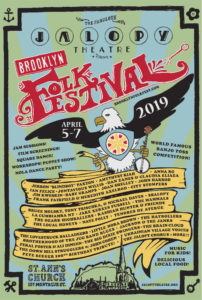
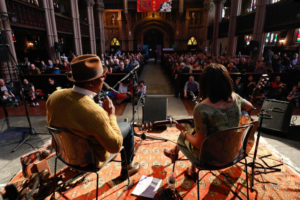
The Brooklyn Folk Festival April 2019
In the political radicalizations and social upheaval’s within the United States of America in the 30s and again in the 60s, we saw an increased interest in folk music. This phenomenon is repeating itself today. We speak today with Eli Smith, the producer of the Brooklyn Folk Festival. He is a banjo player, a folklorist, and a member of the string band The Downhill Strugglers. The Brooklyn Folk Festival is the largest of its type in the country and is now in its 11th year. It takes place in Brooklyn Heights at the historic Saint Ann’s Church this April.
Guest – Eli Smith, a musician, producer and activist from Brooklyn, who has helped organize the event. Eli Smith is also a folklorist and music producer who organizes the annual “Brooklyn Folk Festival.”
—-
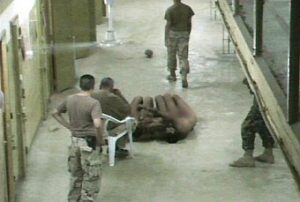
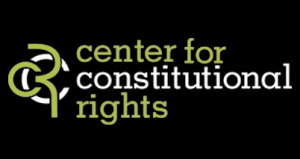
U.S. Appeals Court Opens Abu Ghraib Prison Abuse Case
In 2016, the United States appeals court re-instituted the Abu Ghraib prison abuse case against a private military contractor CACI. Since that time, the plaintiffs have had multiple victories.
The Center for Constitutional Rights is representing the abused prisoners. CCR‘s legal director Baher Azmy said “There is no question that torture is unlawful under domestic, military, and international law. The only issue in this case is whether CACI Will be held accountable – or treated with impunity – for its role in torture at Abu Ghraib. Now, the case is set for trial in Alexandria, Virginia on April 23.
Guest – Attorney Katherine Gallagher filed the case nearly 11 years ago and she is a Senior Staff Attorney at the Center for Constitutional Rights. Katherine works on universal jurisdiction and international criminal law cases involving U.S. and foreign officials and torture and other war crimes, and cases involving private military corporations and torture at Abu Ghraib. Her major cases include Al Shimari v. CACI, the international U.S. torture accountability cases, and Survivors Network of those Abused by Priests (SNAP) v. Vatican, seeking accountability for the crimes against humanity of sexual violence by clergy and cover-up.
———————

———————
Afghanistan War, CIA Sponsored Terror, Civil Liberties, Criminalizing Dissent, Guantanamo, Human Rights, Iraq War, Political Prisoner, Surveillance, Targeting Muslims, Torture, Truth to Power, War Resister
Podcast: Play in new window | Download
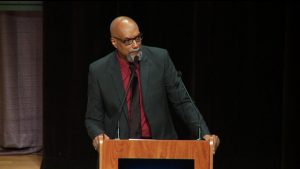
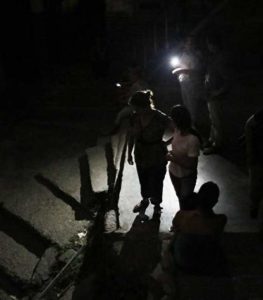
U.S. Peace Council Returns From Venezuela
The Trump administration is attempting to illegally overthrow the democratically elected government of Venezuela and its president Nicolas Maduro.
The effort is being led by Trump’s recently appointed envoy Elliot Abrams, the notorious convicted perjurer who was complicit during the Reagan Administration in the massacre and cover up of the mass slaughter of indigenous people in central America.
John Bolton is working alongside Abrams. He recently showed the American government’s intent by flashing a hand written sign on a yellow pad stating “5000 troops to Venezuela.“ Showing his contempt for international law, he famously said that if the top part of the United Nations building was lopped off it would not make any difference.
So far the United States has been unable to topple all the Venezuelan government. Unable to win over the Venezuelan military the United States is now embargoing Venezuela, which is a form of a medieval siege, aimed at depriving Venezuelans of food and medicine. The U.S. government and its ally Great Britain have frozen Venezuelan assets held abroad and prevented trade with the country, whose economy has shrunk dramatically.
The United States has secured support for it’s coup attempt from the right wing governments in Argentina, Brazil, and Chile as well as the countries of the European Union.
Guest – Ajamu Baraka has recently returned from Venezuela. He is on the steering committee of the US Peace Council, which organized the trip. Baraka is the national organizer of the Black Alliance for Peace, writes for the Black Agenda Report, and was the 2016 Green party candidate for vice president.
—-


Reprieve: UK Human Rights Group
A year after the death penalty was abolished in the United Kingdom, in 1999, human rights attorney Clive Stafford Smith founded the nonprofit organization Reprieve. Smith has represented over 300 prisoners facing the death penalty in the southern United States and has helped secure the release of 65 Guantanamo Bay prisoners, and others internationally who claim that the United States government has tortured them.
Reprieve currently works to represent 15 prisoners in Guantánamo Bay, as well as an evolving caseload of death row clients around the world. It investigates international complicity in extraordinary renditions, and has recently started working in Pakistan with the Foundation for Fundamental Rights to begin discussions on the use of drones there.
Guest – Katie Taylor, a Deputy Director at Reprieve who coordinates the Life After Guantanamo Project. Katie has worked at WarChild UK and in Palestine on human and childrens’ rights issues for several local and international agencies.
—————–

—————–
Civil Liberties, Criminalizing Dissent, Human Rights, Political Prisoner, Surveillance, Truth to Power, War Resister
Podcast: Play in new window | Download
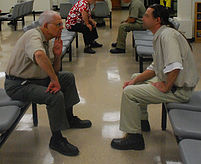
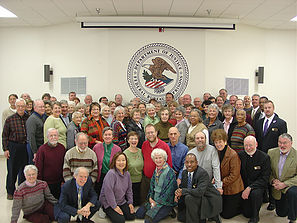
Prison Visitation and Support
In hundreds of correctional facilities across the nation, in person visits are being phased out. Instead, video technology run by Securus and other companies is used to replace these visits. One researcher at the Prison Policy Initiative has pieced together hard to gather stats that suggest at least 600 US prisons have video visitation programs in place. In Florida, for example, on retired prison inspector who writes about video visitation, says that over the past five years, most jails there are using only video visitation and have altogether stopped in-person visitation.
The Prison Policy Initiative’s data suggests that 74% of US correctional facilities that implement video calling end up either reducing in-person visits, or totally eliminating them. Is the elimination of prison visits a human rights violation? Most prisoners receive few, if any visitors, or human contact.
Guest – Steve Gotzler, executive director of the Prison Visitation and Support. Steve is the former program director at the Pennsylvania Prison Society, and he knows firsthand what it’s like to spend time in federal prison.
—-

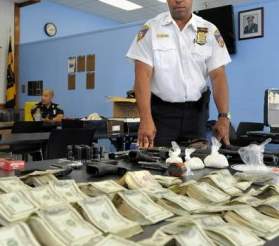
Supreme Court Rules On Civil Forfeiture
In a unanimous decision, the U.S. Supreme Court recently ruled that the Constitution limits the ability of state and local law enforcement to seize and then use cash, property, and other assets that may have been used the commission of crimes, especially when used to fill the coffers of police departments. Law enforcement need only suspect the property has been used as a crime; they don’t need to charge you.
Ruth Bader Ginsburg wrote the opinion on her first day back at the court. Civil liberties organizations have criticized this practice for years. That’s because many local governments use these fines to raise revenue, increasing incentives for arrests.
Not surprisingly, civil asset forfeiture disproportionately affects vulnerable communities, notably African Americans and lower-income neighborhoods. In the state of South Carolina, for example, The Greenville News reported that the state took $17 million from seizures from 2014 to 2016. Sixty-five percent of those targeted were African American. The high Court said that fines may not be excessive, and that states are currently using excessive fines for improper purposes, including for raising revenue.
Guest – Josie Duffy Rice is a lawyer and writer in New York. Josie is a former research director with the Fair Punishment Project.
CIA Sponsored Terror, Civil Liberties, Criminalizing Dissent, Human Rights, Political Prisoner, Prison Industry, Supreme Court, Surveillance, Targeting Muslims, Torture, Truth to Power, War Resister
Podcast: Play in new window | Download

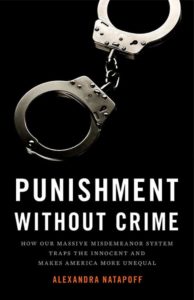
Punishment Without Crime: How Our Massive Misdemeanor System Traps the Innocent and Makes America More Unequal
In the overburdened U.S. criminal justice system, with its burgeoning prison population, we hear a lot about felony convictions. Felonies are crimes usually punishable by a term of more than one year, or the death penalty. What we don’t hear much about are misdemeanors, low level offenses punishable by fines or short terms of imprisonment in local jails.
With ten million petty cases filed annually, most U.S. convictions are misdemeanors. Unlike felonies, however, their processing is typically informal and deregulated. Much like fast-food justice, they have high-volume arrests, weak prosecutorial screening, an overtaxed defense bar, and high plea rates. There is often little meaningful scrutiny to see if convictions are supported by evidence. Innocent people who can’t afford bail often plead guilty just to get out of jail.
What the result of misdemeanor convictions? It’s pretty serious: stigma of a criminal record, misdemeanants are often heavily fined, incarcerated, and/or lose jobs, housing, and educational opportunities. Petty convictions are more frequent and burdensome even as we devote fewer institutional resources to ensuring their validity.
The misdemeanor phenomenon has profound systemic implications. It invites skepticism about whether thousands of individual misdemeanants are actually guilty. It reveals an important structural feature of the criminal system: that due process and rule-of-law wane at the bottom of the penal pyramid where offenses are pettiest and defendants are poorest. Misdemeanor processing is the way poor defendants of color are swept up into the criminal system with little or no regard for actual guilt.
In her new book, Punishment Without Crime: How Our Massive Misdemeanor System Traps the Innocent and Makes America More Unequal, Law Professor Alexandra Natapoff takes an in-depth look at the misdemeanor process is an institutional gateway that explains many of the criminal system’s dynamics and dysfunctions.
Guest – Alexandra Napatoff, University of California Irvine law professor and a member of the American Law Institute. She’s also a former federal public defender, a community organizer, and the recipient of an Open Society Institute Community Fellowship.
—-

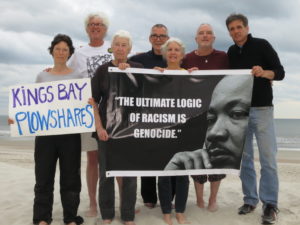
Kings Bay Plowshares 7
In our society nuclear weapons that can destroy all creation are taken as a normal, even an inevitable, part of life. In a dramatic action to break what they call “the crime of silence“ seven Catholic peace activists entered the Kings Bay trident submarine base in Georgia last April to perform an act of symbolic disarmament.
They used hammers to follow the prophecy of Isaiah “to beat swords into plowshares” and poured blood to make holy what was evil in a sacramental action.
Kings Bay is homeport to six ballistic missile trident submarines, each of which deploy 16 trident missile’s carrying four or more warheads of at least 100 kilotons. The Hiroshima bomb was 14 kilotons. Each submarine thus has the distructive power of at least 500 Hiroshima bombs.
The plowshares seven face up to 25 years in federal prison. Their trial is coming up in the next month. Theirs was the latest of 100 plowshares actions around the world since 1980.
Guest – Martha Hennessey, Kings Bay Plowshares 7 co-defendant, activist and volunteer with the New York Catholic Worker.
Guest – Carmen Trotta, Kings Bay Plowshares 7 co-defendant, activist and volunteer with the New York Catholic Worker.
——————

——————
CIA Sponsored Terror, Civil Liberties, Criminalizing Dissent, FBI Intrusion, Human Rights, Political Prisoner, Prison Industry, Supreme Court, Surveillance, Truth to Power, War Resister
Podcast: Play in new window | Download
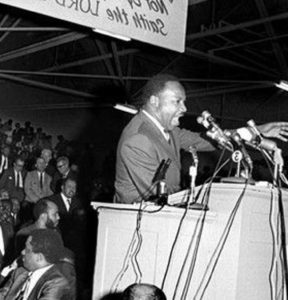
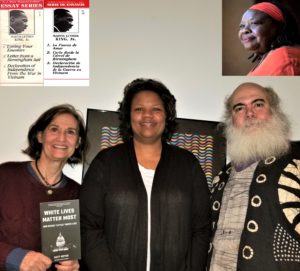
Honoring the Legacy Of Dr. Martin Luther King Jr.
Today on Law and Disorder we bring you a special hour-long program honoring the life and legacy of the Rev. Dr. Martin Luther King. Our listeners know all too well that the Nobel Peace Prize laureate was shot on April 4, 1968–51 years ago. Not so well known is the radical Dr. King, who said in the last months of his life that:
“Our only hope today lies in our ability to recapture the revolutionary spirit and go out into a sometimes hostile world, declaring eternal hostility to poverty, racism, and militarism. With this powerful commitment we shall boldly challenge the status quo.”
Joining us are special guests Ruby Sales, a colleague of Dr. King’s and co-founder of the Student Nonviolent Coordinating Committee; and Rev. Dr. Emma Jordan-Simpson, Executive Director of the Fellowship of Reconciliation (F.O.R.). We’re also joined by author and activist Matt Meyer, a board member of the AJMI.
Dr. King began close ties with A.J. Muste and with the F.O.R. during the Montgomery bus boycott, when FOR staff members Bayard Rustin and Glenn Smiley came to Alabama to support local efforts nonviolently challenging racial segregation. Dr. King developed a special relationship with former FOR chairman A.J. Muste, whose absolute pacifism King had, as a theological seminary student, questioned.
Before heading F.O.R., Muste was a prominent labor leader, helping to found the militant Congress of Industrial Organizations (CIO). And Dr. King, of course, was killed exactly one year after taking a staunch anti-Vietnam war position and in the midst of supporting a significant strike of sanitation workers, linking—as he had been—issues of race, class, and violence as King deepened his critique of the roots of oppressive U.S. society.
Guest – Ruby Sales is the founder and director of the “SpiritHouse Project”, a national organization that uses the arts, research, education, action and spirituality to bring diverse peoples together to work for racial, economic and social justice as well as for spiritual maturity. A life-long organizer, scholar and public theologian in the areas of civil, gender and other human rights, she was a member of the Student Non-violent Coordinating Committee and served as national convener of the Make Every Church A Peace Church movement.
Guest – Rev. Dr. Emma Jordan-Simpson is the Executive Pastor of The Concord Baptist Church of Christ, Brooklyn, NY. She has combined pastoral ministry with the social justice community. The former Executive Director of the Children’s Defense Fund she is now the Executive Director of the Fellowship of Reconciliation.
Guest – Matt Meyer is Secretary-General of the International Peace Research Association, Chair of the International Fellowship of Reconciliation’s Financial Advisory Committee, Africa Support Network Coordinator of the War Resisters International, and Senior Research Scholar at U-Mass Amherst. As current National co-chair of FOR and former Chair of the War Resisters League, he is second only to AJ Muste in holding the top post of those two historic US peace organizations. He is author of the recently published White Lives Matter Most And Other “Little” White Lies.
———-

———-
Censorship, Civil Liberties, Criminalizing Dissent, Crony Capitalism, Human Rights, Supreme Court, Surveillance, Truth to Power, War Resister
Podcast: Play in new window | Download
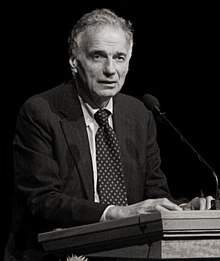
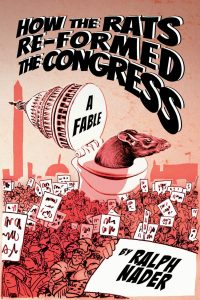
How the Rats Re-Formed Congress
A fable is a short tale that anthropomorphizes animals. The animals personify human virtues and vices, and function as an instrument of moral instruction. We mention this because Ralph Nader joins us to discuss his new book How the Rats Re-Formed Congress. It’s a Fable about an invasion of rats in Congress that triggers a peoples’ political revolt. It begins when a Congressional reporter breaks a bizarre story: “Rats have invaded the toilet bowls” of the Speaker of the House and the Minority Leader. A national news frenzy ensues.
Activists seize on the breaking story to organize for a populist agenda. Spontaneous rallies erupt. The activists see the rats upending “business as usual” routines on Capitol Hill as a symbol against lobbyists and corporate Congress. Millions flood into the nation’s capitol to take back Congress from Wall Street. Congressional offices are deluged with citizen rallies and meetings. Members are challenged in primaries. Incumbents join the movement.
Wall Street and its lobbyists warn of economic collapse and mass layoffs if the people’s agenda passes Congress. Corporate front groups are formed to disrupt peaceful crowds. Despite that, corporate lobbyists and think tanks can’t overcome the organized will of the determined citizenry. Tortmuseum.org
Listen to our past interview with Ralph Nader about the Tort Museum.
Guest – Ralph Nader, one of the nation’s most effective and well-known social critics. He has raised public awareness and increased government and corporate accountability. As a young lawyer in 1965 he made headlines with his book Unsafe at Any Speed, leading to congressional hearings and passage of a series of life-saving auto safety laws in 1966. His example has inspired a generation of consumer advocates, citizen activists and public interest attorneys. Full biography.
————————-

————————-






















